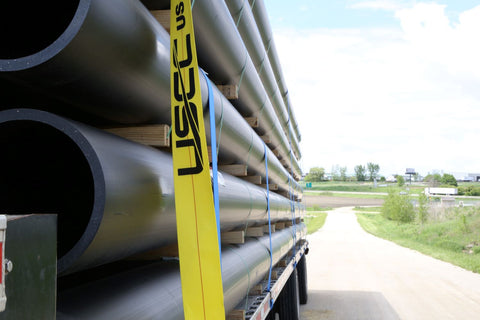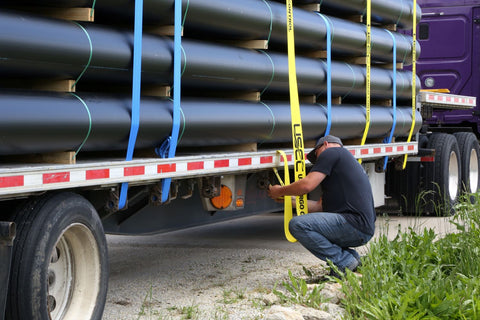
5 Common Flatbed Trailer Winch Problems (+ Solutions)
Flatbed trailer winches are considered essential for securing cargo to flatbed trailers during transportation. These devices comprise of heavy-duty steel and protective finish for a durable, reliable tie down component mounted along the sides or bottoms of trailers. When used with winch straps and winch track, truckers create a complete winch tie down system that handles heavy cargo better than other tie down systems available.
- READ: Winches 101
However, like any mechanical device, winches encounter problems over time. These problems include malfunctioning, improper setup and potential overloading, damage, wear and tear, and overall maintenance. To ensure their reliability and longevity, it's essential to be aware of common problems and take proactive steps to prevent and address them. We discuss five problems with flatbed trailer winches and how to fix them to keep your equipment up to standard.
1. Strap or Cable Damage
One of the most common issues with flatbed trailer winches is damage to the strap or cable used to tie down cargo. Over time, tie downs start to fray or show signs of wear and tear from constant usage. Depending on the type of tie down you use (some winches, like our 4" Weld-On Combination Winch, works with both webbing and wire rope), you may notice things like threads becoming undone or wires fraying from cable.
- Check out our Wire Rope offerings today!
Winch straps or cable wear out or weaken from constant exposure to the elements and pressure from heavy loads. And when they aren't regularly inspected for these issues, using worn straps can pose serious threats like strap failure or shifting cargo. This creates potential harm for the trucker, the trailer, the cargo, and others sharing the road.
To prevent these threats from happening, truckers need to regularly clean and inspect winch straps. If there are signs of any wear and tear, then replace damaged or worn out parts immediately to maintain secure load fastening, as worn out, damaged, or broken straps should be placed out of commission. Truckers should also consider investing in high-quality, durable straps and/or cables, as well as corner protectors and wear pads to prevent cutting and abrasion and prolong their straps' lifespan.
- WATCH: Corner Protection Comparison

2. Rust and Corrosion for Flatbed Trailer Winches
Piggybacking off the first point, winches endure lots of exposure from the elements and strain from the tie down forces - not just the winch straps, themselves! Especially on the road, flatbed trailer winches encounter different types of elements, including harsh weather conditions, road debris, dirt, gravel, and more. This oftentimes leads to rust and corrosion on the device, making it harder and/or more dangerous to operate.
US Cargo Control offers different flatbed trailer winches made with a protective black painted coating to minimize damage from these elements. However, neglecting to constantly clean and lubricate these devices over time increases the impact that moisture and other environmental factors have to their degradation. For additional protection, truckers can apply rust inhibitors to coat their trailer winches.
3. Mechanical Failures
Just like most devices and machinery, flatbed trailer winches experience their share of mechanical failures. Common issues include gear misalignment, broken springs, or a malfunctioning ratchet mechanism. The biggest culprits to these issues are constant use and high-pressure tie down forces that go beyond the capacity of the winch's and winch strap's working load limit. Constant exposure to harsh conditions and minimal upkeep also play their roles to these malfunctions.
Fixing mechanical problems with flatbed trailer winches ranges from simple fixes to unsalvageable devices. Depending on the severity of the problem, truckers should refer to the user manual for troubleshooting. In some cases, mechanical problems require the expertise or a professional mechanic.

4. Improper Use or Setup
With heavy cargo needed for transport, truckers fall trap into testing the limits of their winch systems. This includes tying cargo down beyond their winch systems' working load limits.
Applying excessive force or overloading the winch leads to earlier wear and damage to the flatbed trailer winch and strap. This occurs if the winch is used to secure loads that exceed its capacity or if operators misuse it. It's important for truckers to always adhere to the winch's load capacity rating. By avoiding using the winch for purposes other than its intended function, such as lifting or towing, truckers remain intact on DOT cargo securement protocol and ensure their safety while on the road.
Additionally, using winches in the wrong way can cause serious winch problems. Examples include using low-profile winches when excess webbing is present, or when portable winches aren't properly secured using the provided screws to tie down cargo. Truckers need to be aware of the type of flatbed trailer winches they use, as well as how that plays into their overall system's working load limit.
5. Lack of Proper Maintenance for Flatbed Trailer Winches
Lastly, and most importantly, neglecting regular maintenance leads to a host of winch problems (see above), decreasing functionality and shortening the lifespan of these devices. By developing a routine maintenance schedule for winches, truckers can significantly extend the life of winch components, reducing the likelihood of future breakdowns.
These regular inspections and maintenance need to include proper cleaning, lubrication of moving parts, and addressing any malfunctions promptly. Truckers should also place any broken winches out of service and replace them immediately. Following these guidelines help maintain cargo safety and reduce downtime, contributing to a more efficient and profitable operation.

Winch Tie Down Systems from US Cargo Control
Flatbed trailer winches are critical tools for cargo securement during transportation. It's important to have a complete winch tie down system to keep your heavy-duty cargo secure during transit. US Cargo Control offers high-quality winch tie down essentials for your truck and trailer:
-
Winch Straps: Made of heavy-duty, industrial-grade webbing, our winch straps come in a variety of makes, sizes, lengths, and colors to cater to your specific tie down needs.
-
Winch Track: Also known as C track, these rails fit nicely on trailer sides to accompany sliding winches. This allows for versatile and reliable winch placement for different types of cargo loads.
- Winch Bars: These tools provide the leverage necessary to secure cargo to your flatbed trailer. Available in a wide variety of standard and ergonomic designs.
Other winch tie down essentials include:
-
Strap Winder: Keep excess webbing under control using these devices. With the ability to attach to any side rail of flatbed trailers, strap winders make excess webbing incredibly manageable.
-
WATCH: How to Use a Strap Winder
-
Ratcheting Winch Cap: This device fits nicely over the end cap of the winch, creating a ratcheting component for easier tightening. Saving you time and energy, ratcheting winch caps prevent possible strain or injury from tightening, as well.
More Articles You May Like:
10 Ways to Store Tie Down Straps
Differences Between Winch Bars
How to Care for Ratchet Straps
The Do's & Don'ts of Load Securement



